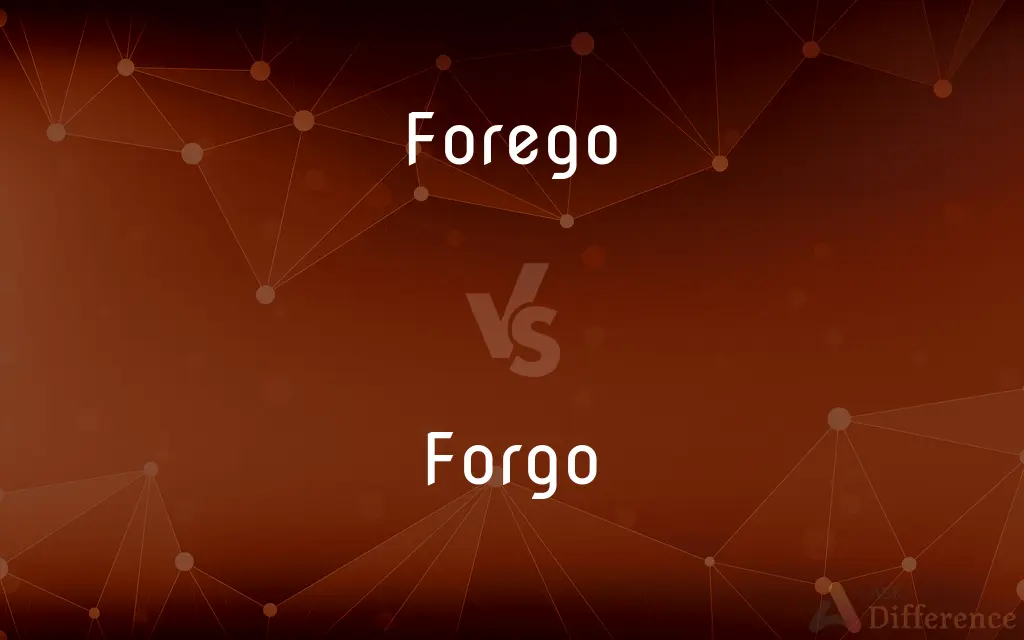Forego vs. Forgo — What's the Difference?
By Maham Liaqat & Fiza Rafique — Updated on March 20, 2024
Forego means to precede in place or time, while forgo means to abstain from or do without.

Difference Between Forego and Forgo
Table of Contents
ADVERTISEMENT
Key Differences
Forego, often confused with forgo, implies to precede or go before something in time or place, suggesting a position of priority or antecedence. Forgo, on the other hand, refers to the act of doing without something, abstaining or refraining from something by choice.
While forego focuses on the aspect of preceding in time or place, forgo emphasizes a voluntary decision to abstain from something. The distinction is crucial in contexts where the timing or sequence of events is discussed versus situations where the emphasis is on choice and abstention.
The difference also lies in their usage in sentences; forego is used to describe something that comes before another, often in a temporal sense, whereas forgo is used to indicate the giving up or abstaining from something. This distinction helps clarify the intended meaning in various contexts, ensuring accurate communication.
In terms of applicability, forego's usage is more specific and tends to appear in contexts requiring a demonstration of temporal sequence or precedence. Forgo, with its broader applicability, appears in a wide range of contexts, from casual conversations about daily choices to more serious discussions about significant life decisions.
Understanding the difference between forego and forgo is essential for precise language use, especially in written communication, where the context might not always be clear. This distinction allows for clearer expression of either the sequence of events or the act of abstention, depending on the intended meaning.
ADVERTISEMENT
Comparison Chart
Meaning
To precede in place or time
To abstain from, do without
Common Usage
Less common, formal or literary
Wider usage, everyday language
Example Context
Describing something that comes before in time
Choosing not to engage or partake in something
Emphasis
Temporal sequence or precedence
Voluntary decision, abstention
Key Distinction
Focuses on preceding events or conditions
Focuses on the act of giving up or abstaining
Compare with Definitions
Forego
Indicates priority or antecedence.
Traditions that forego modern practices often have deep cultural roots.
Forgo
Indicates a sacrifice or deliberation.
Forgoing immediate pleasure for long-term gain is wise.
Forego
Less commonly used in everyday language.
The prologue seeks to describe the myths that forego the empire's rise.
Forgo
To abstain from, do without.
He decided to forgo his morning coffee in favor of extra sleep.
Forego
Used in temporal sequences.
The inventions that forego the 20th century revolutionized society.
Forgo
Describes a voluntary choice.
She chose to forgo the opportunity for a year of travel.
Forego
To precede in place or time.
The events that forego the ceremony set the stage for a historic day.
Forgo
Used in a wide range of contexts.
To forgo dessert is a small act of discipline.
Forego
Found in formal or literary contexts.
The chapters forego the introduction in the book’s unique structure.
Forgo
Common in everyday language.
They had to forgo traditional celebrations due to the storm.
Forego
Forego (April 30, 1970 – August 27, 1997) was an American Thoroughbred racehorse that won eight Eclipse Awards including Horse of the Year, Champion Handicap Horse and Champion Sprinter.
Forgo
Go without (something desirable)
She wanted to forgo the tea and leave while they could
Forego
Variant spelling of forgo
Forgo
To abstain from; relinquish
Unwilling to forgo dessert.
Forego
Precede in place or time
So Abdulmelik went away to his house, whither he found that the money had foregone him
Forgo
To let pass, to leave alone, to let go.
Forego
To precede, as in time or place. See Usage Note at forgo.
Forgo
To do without, to abandon, to renounce.
Forego
Variant of forgo.
Forgo
To refrain from, to abstain from, to pass up, to withgo.
I wouldn't forgo something, unless I'm convinced that it's detrimental in some way or another.
Forego
To abstain from; relinquish
Unwilling to forgo dessert.
Forgo
To pass by; to leave. See 1st Forego.
For sith [since] I shall forgoon my libertyAt your request.
And four [days] since Florimell the court forwent.
Forego
To precede, to go before.
Forgo
To abstain from; to do without; to refrain from; to renounce; - said of a thing already enjoyed, or of one within reach, or anticipated. See 1st forego, 2.
Forego
Alternative spelling of forgo; to abandon, to relinquish
Forgo
Do without or cease to hold or adhere to;
We are dispensing with formalities
Relinquish the old ideas
Forego
To quit; to relinquish; to leave.
Stay at the third cup, or forego the place.
Forgo
Lose or lose the right to by some error, offense, or crime
Forego
To relinquish the enjoyment or advantage of; to give up; to resign; to renounce; - said of a thing already enjoyed, or of one within reach, or anticipated.
All my patrimony,,If need be, I am ready to forego.
Thy lovers must their promised heaven forego.
[He] never forewent an opportunity of honest profit.
Forgo
Refrain from consuming;
You will have to forgo alcohol
Forego
To go before; to precede; - used especially in the present and past participles.
Pleasing remembrance of a thought foregone.
For which the very mother's face forewentThe mother's special patience.
Forego
Be earlier in time; go back further;
Stone tools precede bronze tools
Common Curiosities
Can forego and forgo be used interchangeably?
No, they have distinct meanings and cannot be used interchangeably.
What does it mean to forego something?
To forego means to precede in place or time, often indicating a sequence or priority.
How does one decide between using forego and forgo?
The choice depends on whether the context involves preceding in time/place (forego) or abstaining (forgo).
Is it common to confuse forego and forgo?
Yes, due to their similar spelling and pronunciation, they are often confused.
Can forgo imply sacrifice?
Yes, forgoing often involves a deliberate choice that may include sacrificing something.
Can a historical event forego another?
Yes, if it precedes the other in time, it can be said to forego it.
What does forgo imply?
Forgo implies making a choice to abstain from or do without something.
Is forego commonly used in modern language?
Forego is less common and more often found in formal or literary contexts.
What are examples of forgoing something?
Examples include forgoing dessert for health reasons or forgoing an opportunity for personal reasons.
How does understanding the difference between forego and forgo benefit writing?
Knowing the difference enhances precision and clarity in communication.
Does forego always refer to time sequences?
Forego typically refers to time sequences or precedence but can also imply precedence in terms of importance.
What might be forgoed for health reasons?
One might forgo smoking, sugary foods, or alcohol for health reasons.
Share Your Discovery

Previous Comparison
Supposedly vs. Supposably
Next Comparison
Lightening vs. LightningAuthor Spotlight
Written by
Maham LiaqatCo-written by
Fiza RafiqueFiza Rafique is a skilled content writer at AskDifference.com, where she meticulously refines and enhances written pieces. Drawing from her vast editorial expertise, Fiza ensures clarity, accuracy, and precision in every article. Passionate about language, she continually seeks to elevate the quality of content for readers worldwide.













































